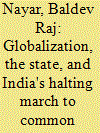| Srl | Item |
| 1 |
ID:
106453


|
|
|
|
|
| Publication |
2011.
|
| Summary/Abstract |
This article argues that most analyses of the Kargil conflict concede the important role played by the United States in understanding how India regained control of the Kargil heights, but fail to explain how India's intra-war compellent threat forced Washington to bring irresistible pressure to bear on Islamabad. The Indian decision to threaten asymmetrical escalation was the result of domestic pressures and military difficulties facing the Vajpayee-led caretaker government. The article shows that Washington pursued an "impartially" interventionist strategy until it came under Indian pressure to forsake its "balanced" approach towards ending the conflict. The article also shows how the "asymmetry of motivation" between New Delhi and Washington was an important factor in terminating hostilities in India's favor.
|
|
|
|
|
|
|
|
|
|
|
|
|
|
|
|
| 2 |
ID:
106452


|
|
|
|
|
| Publication |
2011.
|
| Summary/Abstract |
When political parties organize, compete and maintain interests at different levels, they bring interconnections both between as well as horizontally across levels. This study suggests that the autonomy of state politics formulation may have to pay greater attention to the federal framework and give more consideration to the role of polity-wide parties. This study uses the autonomy thesis as a heuristic tool and expands the discussion beyond state politics as considered by Yogendra Yadav-Suhas Palshikar. It examines the interface between the rise of the state as the primary unit and the functioning of political parties, especially in a multi-party competitive scenario where parties are forced to enter into coalitions. By situating India and its coalition experiences within a broader literature of comparative politics, the study tries to enrich our understanding about the relationship between federalism, political parties and coalition politics.Government
S
|
|
|
|
|
|
|
|
|
|
|
|
|
|
|
|
| 3 |
ID:
106451


|
|
|
|
|
| Publication |
2011.
|
| Summary/Abstract |
As a social phenomenon, globalization has been the target of much criticism. One particular line of attack holds that it will lead to the segmentation and disintegration of the national economy. However, an examination of the long process of reform of the indirect tax system in India underlines, paradoxically, the significant role of globalization precisely in fostering domestic economic integration in the form of a common market, which would overcome the economic segmentation existing prior to globalization. Interestingly, such tax reform has, in considerable part, been driven by the need to meet globalization's challenge that India's economy be efficient and internationally competitive. At the same time, one should not underestimate the critically important role of the state as an institutional variable-which critics tend often to ignore-in carrying through the goal of establishing a common market, presently a work still in progress.
|
|
|
|
|
|
|
|
|
|
|
|
|
|
|
|